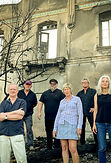

MEKONS
Sonic adventurers, punk rock fundamentalists, exuberant luddites, willing outcasts.
“The mekons are the most revolutionary group in the history of rock ‘n’ roll” – wrote rock critic Lester Bangs
The genre-defying mekons formed in Leeds, England in 1977. Born from the emerging British punk scene, they progressed from art students with no musical skills to the prolific, raucous progeny of Hank Williams. This current classic line-up has remained intact since the mid-1980s, continuing to regularly tour and release new music through to now. Theirs is an improbable history – a surprising and influential embrace of folk and country music with occasional forays into the art world. They have always worked collaboratively and collectively with all work credited to the band, never to individuals. Their mind-boggling output consistently blurs the lines between high art and low and has included exhibitions in the UK and US, a deranged pirate musical recorded and staged with Kathy Acker, an art performance with Vito Acconci, and several books including the unique art catalog/unfinished novel Mekons United. "Revenge of the mekons", a documentary about the band received nationwide release in 2015 on Music Box Films. The mekons continue to make bold, unpredictable music while staying true to the punk ethos. Their mind-boggling output consistently blurs the lines between high art and low and they remain one of the truly great live bands.
Their last album "Exquisite" was recorded completely remotely during the early months of lockdown and released on Bandcamp in June 2020. The band’s new album, “Horror” was released on Fire Records in April 2025.



.jpg)
.jpg)